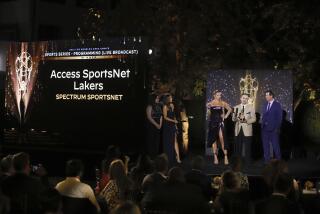A TV Network That Will Be All Wet
Stuart Evey, the man who launched ESPN when he worked for Getty Oil, now is spearheading a new sports network built around water sports.
Water sports? Why would folks who frolic in swimming pools, scuba dive, water ski or fish want to spend their time watching others do the same things?
“There are 100 million people who participate in water sports, enough to get a sizable audience to watch,” says Evey. “And there is the magic of the VCR.
“Outdoor shows are getting good ratings. There were about 20 outdoor-type shows on last year and some cleared 60 million homes.”
Water Sports Network is aiming to provide “an umbrella for major manufacturers in water-related businesses,” Evey says. The network will do so by dealing directly with over-the-air independent stations and network affiliates, at first offering a show similar to Entertainment Tonight as a sample. It hopes to expand from there.
“We’re committed to making 13 shows and we hope stations will take all 13 because we’d like to see continuity,” Evey explains. “But we have to offer only one show too.”
The pilot currently is being filmed and will include segments on various water sports, from fishing to skiing to windsurfing.
“It will be a magazine format, segments from comedy to racing to feature stories and instructional how-to presentations,” says Evey, the chairman of the board and director. “Outdoor shows generally have in common being poorly produced, unscripted and a one-subject show.We have overcome that with our plans and strategies and the first show we hope will be ready for Sept. 1.”
The one-hour pilot will include 12 minutes for advertising. Evey says there has been no trouble attracting advertisers from the water sports field.
“Generally they all have been limited in the past to magazine advertising, though they’ve done spot stuff here and there,” he says. “WSN had been a pilot program for testing by some Seattle businessmen under the direction of Jack King (WSN’s president). It was tested in the Northwest through cable, then was taken to San Francisco through cable.
“What emanated was a desire by local manufacturers who are nationally oriented in water sports to expand. They suggested if this were a national situation, it would be a wonderful opportunity to advertise and promote nationally.”
Evey claims there are four main reasons why he anticipates mass market success for WSN:
--The upscale, high-interest level of viewers interested in water sports and recreation;
--Stations’ need for new, fresh sports programming on weekends;
--The multi-billion dollar market supported by manufacturers and suppliers of water-oriented services;
--The attraction of other blue-chip advertisers to the higher-than-average income level of viewers who support water activities such as yachting, boating and fishing.
There is approximately $90 billion worth of products that can be associated with water sports, from boats to fishing gear to swim wear and suntan lotions. All of those advertisers are ripe for WSN.
But the success of the network may depend on attracting other advertisers, such as major automobile and leisure-product companies.
“And we’ll definitely go after a Pepsi or Coke,” says Evey.
What WSN won’t go after is cable television.
“Cable ratings and the penetration is not substantial enough, it doesn’t reach enough households,” says Evey. “If you’re on ESPN, you’ve got the widest distribution possible but it isn’t comparable (to over-the-air).
“And we can’t bastardize it. The local stations will not buy it if we’re coming into their area over cable.”
More to Read
The biggest entertainment stories
Get our big stories about Hollywood, film, television, music, arts, culture and more right in your inbox as soon as they publish.
You may occasionally receive promotional content from the Los Angeles Times.










